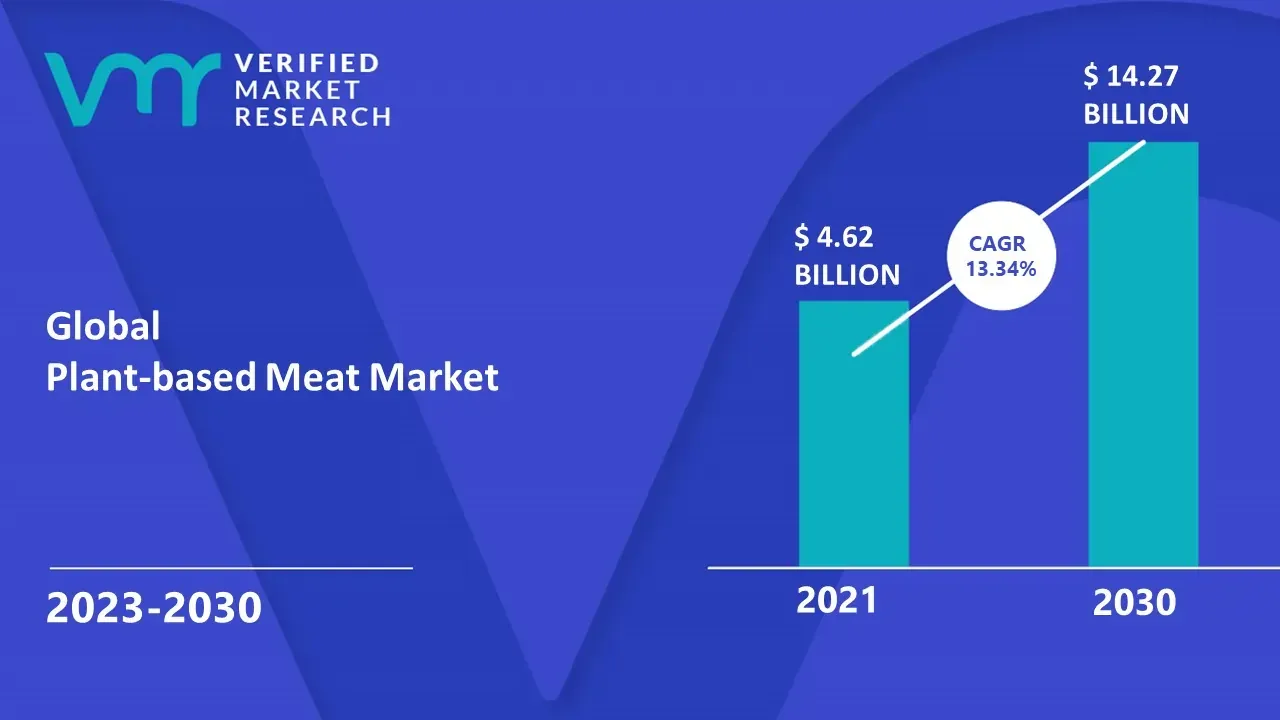
Plant based Meat Market to hit $ 14.27 billion by 2030: Verified Market Research
The Global Plant based Meat Market size was valued at USD 4.62 Billion in 2021 and is projected to reach USD 14.27 Billion by 2030, growing at a CAGR of 13.34% from 2023 to 2030.
The global plant-based meat market refers to the industry segment focused on the production, distribution, and consumption of meat substitutes derived from plant-based sources. Plant-based meats are designed to mimic the taste, texture, and nutritional profile of traditional animal-derived meats while offering environmental, ethical, and health benefits. These meat alternatives are typically made from ingredients such as soy, wheat gluten, pea protein, mushrooms, and other plant-based sources. They undergo processing techniques such as extrusion, fermentation, and flavoring to replicate the sensory characteristics of meat products.
The market for plant-based meats has experienced significant growth in recent years, driven by various factors including increasing consumer awareness of the environmental impact of animal agriculture, concerns about animal welfare, and growing interest in plant-based diets for health reasons. Additionally, advancements in food technology and innovation have led to the development of plant-based meat products that closely resemble the taste and texture of conventional meats, attracting a broader consumer base. Key players in the plant-based meat market include food manufacturers, retailers, and startups offering a range of plant-based meat products such as burgers, sausages, nuggets, and meatballs. The market is characterized by a diverse range of offerings catering to different dietary preferences and culinary preferences, with opportunities for further innovation and expansion in the future.
Request PDF Sample Copy of Report: (Including Full TOC, List of Tables & Figures, Chart) @ https://www.verifiedmarketresearch.com/download-sample?rid=137243
Plant based Meat Market Drivers
The Plant based Meat Market has seen significant growth due to several key drivers:
- Increasing Health Awareness: Growing concerns about health and wellness, including the link between meat consumption and chronic diseases such as heart disease, diabetes, and certain cancers, are driving consumers to seek healthier dietary alternatives. Plant-based meats offer a cholesterol-free, lower-fat alternative to traditional meat products, making them appealing to health-conscious consumers.
- Environmental Sustainability: Awareness of the environmental impact of animal agriculture, including greenhouse gas emissions, deforestation, and water usage, is driving consumers to seek more sustainable food options. Plant-based meats have a significantly lower environmental footprint compared to conventional meat production, making them a more eco-friendly choice.
- Ethical and Animal Welfare Concerns: Increasing awareness of animal welfare issues associated with factory farming and slaughterhouses is prompting consumers to seek cruelty-free alternatives to animal-derived meats. Plant-based meats offer a compassionate choice for consumers who want to avoid contributing to animal suffering.
- Innovation and Product Development: Advances in food technology and innovation have led to the development of plant-based meat products that closely mimic the taste, texture, and appearance of conventional meats. Companies are continuously investing in research and development to improve the sensory characteristics and nutritional profile of plant-based meats, attracting a broader consumer base.
- Changing Consumer Preferences: Shifting consumer preferences towards flexitarian, vegetarian, and vegan diets, driven by a desire for healthier, more sustainable food choices, are fueling demand for plant-based meats. Millennials and Gen Z consumers, in particular, are driving the growth of plant-based food products, seeking options that align with their values and lifestyle choices.
- Retail and Foodservice Expansion: Increased availability of plant-based meat products in retail stores, supermarkets, and foodservice outlets, as well as partnerships with restaurants and fast-food chains, are expanding access to plant-based options and driving consumer adoption. The growing visibility and accessibility of plant-based meats are making it easier for consumers to incorporate them into their diets.
Plant based Meat Market Limitations and Restrictions
The Plant based Meat Market faces several limitations and restrictions, including:
- Price Premium: Plant-based meat products often come with a price premium compared to conventional meat products, which can deter price-sensitive consumers from making the switch. Higher production costs, including sourcing quality plant-based ingredients and investing in research and development, contribute to the higher price point of plant-based meats.
- Taste and Texture Challenges: While significant strides have been made in improving the taste, texture, and sensory characteristics of plant-based meats, some consumers still find them lacking compared to traditional meat products. Achieving the perfect balance of flavor, juiciness, and mouthfeel can be challenging and requires ongoing innovation and refinement.
- Limited Availability and Variety: Plant-based meat products may have limited availability in certain regions or markets, particularly in rural areas or developing countries with less developed plant-based food industries. Additionally, the variety of plant-based meat options available may be limited compared to the wide range of animal-derived meat products, which could limit consumer choice and adoption.
- Regulatory Challenges: Regulatory frameworks governing the labeling, marketing, and safety of plant-based meat products vary by country and region, leading to inconsistencies and uncertainties for manufacturers and consumers. Ensuring compliance with existing regulations and standards, as well as navigating potential regulatory changes or restrictions, can pose challenges for companies operating in the plant-based meat market.
- Perception and Skepticism: Despite growing acceptance and adoption of plant-based diets, some consumers remain skeptical or hesitant to try plant-based meat products due to preconceived notions about taste, nutrition, or authenticity. Overcoming these perceptions and educating consumers about the benefits and qualities of plant-based meats is essential for driving adoption and market growth.
- Competition from Alternative Proteins: Plant-based meat products face competition from other alternative protein sources, such as lab-grown meat, insect-based protein, and fungal-based protein. These emerging technologies and products offer additional options for consumers seeking sustainable and ethical protein alternatives, potentially fragmenting the market and intensifying competition.
Get a Discount On The Purchase Of This Report @ https://www.verifiedmarketresearch.com/ask-for-discount?rid=137243
Top Key Players in Plant based Meat Market
The major players in the Plant based Meat Market:
- Beyond Meat (US)
- Impossible Foods Inc. (US)
- Maple Leaf Foods (Canada)
- Unilever (Netherlands)
- Conagra Brands, Inc (US)
- Kellogg Co. (US)
- Tofurky (US)
- Valio Oy (Finland)
- Sunfed (New Zealand)
- VBites Foods Ltd (UK)
- The Kraft Heinz Company (US)
- Yves Veggie Cuisine (US)
- Ojah B.V. (Netherlands)
- Moving Mountains Foods (US)
- Eat Just, Inc. (US)
- LIVEKINDLY Collective (Germany)
- Gooddot (India)
- No Evil Foods (US)
Segmentation for a report on “Plant based Meat Market”:
Segmentation analysis for the Plant-Based Meat Market involves dividing the market into distinct segments based on various factors such as product type, source, distribution channel, and geographic region. This analysis helps companies understand the diverse needs and preferences of different customer groups within the market and tailor their strategies accordingly.
- By Product Type:
-
-
- Burgers
- Sausages
- Nuggets
- Ground Meat
- Meatballs
- Others (such as deli slices, hot dogs, and meatloaf)
-
- By Source:
-
-
- Soy-based
- Wheat-based (seitan)
- Pea-based
- Mushroom-based
- Others (such as lentil-based, chickpea-based, and jackfruit-based)
-
- By Distribution Channel:
-
-
- Supermarkets and Hypermarkets
- Convenience Stores
- Online Retail
- Foodservice (restaurants, cafeterias, and catering)
- Specialty Stores
- Others (such as vending machines and food trucks)
-
- By Geography:
-
- North America
- Europe
- Asia Pacific
- Latin America
- Middle East and Africa
Plant based Meat Market Scope of the Reports
The plant-based meat market has experienced significant growth in recent years, driven by increasing consumer awareness of environmental sustainability, health concerns, and ethical considerations. As consumers seek alternatives to traditional meat products, the plant-based meat industry has expanded its offerings, providing plant-derived substitutes that mimic the taste, texture, and nutritional profile of conventional meat. This market encompasses a wide range of products, including burgers, sausages, nuggets, and other meat analogs made from ingredients such as soy, peas, wheat gluten, and mushrooms. With advancements in food technology and growing investments in research and development, the plant-based meat market is expected to continue its upward trajectory, appealing to a broader audience of consumers seeking healthier and more sustainable dietary options.
Furthermore, the plant-based meat market’s scope extends beyond retail consumption, with foodservice providers, restaurants, and fast-food chains increasingly incorporating plant-based options into their menus to cater to shifting consumer preferences. This trend is fueled by collaborations between food manufacturers and foodservice businesses, as well as the introduction of innovative plant-based products designed specifically for commercial use. Moreover, the market landscape is characterized by fierce competition among both established players and startups, driving continuous innovation and product development. As the demand for plant-based meat continues to rise globally, driven by factors such as concerns over climate change, animal welfare, and personal health, the plant-based meat market’s scope is poised to expand further, presenting lucrative opportunities for stakeholders across the supply chain.
Table of Contents (TOC) for a report on “Plant based Meat Market”:
1. Executive Summary
- Key Findings
- Market Overview
- Competitive Landscape
2. Introduction
- Research Objectives
- Research Methodology
- Scope and Segmentation
- Assumptions and Limitations
3. Market Overview
- Market Definition
- Market Size and Growth
- Market Dynamics
- Drivers
- Restraints
- Opportunities
- Challenges
- Porter’s Five Forces Analysis
- PESTLE Analysis
4. Plant based Meat Market, by Product Type
- Burgers
- Sausages
- Nuggets
- Ground Meat
- Meatballs
- Others (such as deli slices, hot dogs, and meatloaf)
5. Plant based Meat Market, by Source
- Soy-based
- Wheat-based (seitan)
- Pea-based
- Mushroom-based
- Others (such as lentil-based, chickpea-based, and jackfruit-based)
6. Plant based Meat Market, by Distribution Channel
- Supermarkets and Hypermarkets
- Convenience Stores
- Online Retail
- Foodservice (restaurants, cafeterias, and catering)
- Specialty Stores
- Others (such as vending machines and food trucks)
7. Plant based Meat Market, by Region
- North America
- Europe
- Asia-Pacific
- Middle East and Africa
- Latin America
8. Competitive Landscape
- Market Share Analysis
- Competitive Scenario
- Company Profiles
- Recent Developments
9. Conclusion
10. Appendix
- Glossary of Terms
- List of Abbreviations
- References
For More Information or Query, Visit @ Global Plant based Meat Market Size And Forecast
About Us: Verified Market Research
Verified Market Research is a leading global research and consulting firm with over 10 years of experience providing advanced analytical research solutions, tailored consulting and in-depth data analysis to individuals and companies seeking accurate, reliable and timely research. Data and technology consulting. It provides insights into strategic and growth analysis, the data you need to achieve business goals, and helps you make key revenue decisions.
Our research works as partners to provide our clients with accurate and valuable information to help them make better data-driven decisions, understand market forecasts, capitalize on future opportunities and help optimize efficiency. The industries we cover span a wide range of industries including technology, chemicals, manufacturing, energy, food and beverage, automotive, robotics, packaging, construction, mining and gas. etc.
Verified market research help you understand comprehensive market indicator factors as well as current and future market trends. Our analysts have extensive expertise in data collection and management, using industry methodologies to collect and examine data at every step. They are trained to combine the latest data collection techniques, superior research methodologies, specialized knowledge, and years of collective experience to produce informative and accurate research results.
Having served over 5,000 clients, we provide trusted market research services to over 100 global Fortune 500 companies, including Amazon, Dell, IBM, Shell, Exxon Mobil, General Electric, Siemens, Microsoft, Sony and Hitachi. We provided it. We work with some of the world’s leading consulting firms, including McKinsey & Company, Boston Consulting Group and Bain & Company, delivering customized research and consulting projects for companies around the world.
Contact US:
Mr. Edwyne Fernandes
Verified Market Research
Mr. Edwin Fernandez
Verified Market Research
USA: +1 650 781 4080
APAC: +61 485 860 968
EMEA: +44 788 886 6344
Email: [email protected]
Website:- https://www.verifiedmarketresearch.com/
Top Trending Reports from Verified Market Research
Plant Based Food Market Size, Scope And Forecast


